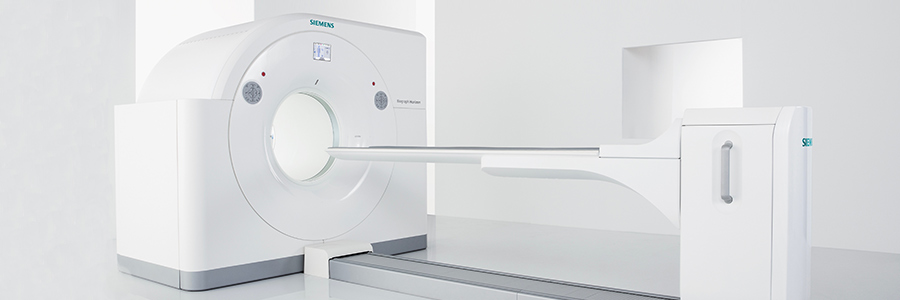PET/CT
Palms Imaging Center has upgraded its PET/CT Scanner to the NEW Siemens Biograph Horizon System. This system offers the newest PET/CT technology, utilizing a digitized signal processing technique and time-of-flight technology for reduced doses, faster scan times, and maximum accuracy. Our PET/CT scan computerized tomography for cancer gives valuable information, giving you a clear view to help you make smart choices.
With the new Siemens Biograph Horizon System, we offer the latest PET/CT technology. It uses less radiation, gives faster scans, and is very accurate. Our PET scans for cancer screening help you make clear and confident choices.
What is PET/CT?
PET/CT is a powerful imaging technique that holds great promise in the diagnosis and treatment of many diseases, particularly cancer. In a non-invasive test, PET/CT accurately images metabolic and anatomic information in the human body in a single scan. This allows your physician to examine your entire body at once. PET/CT provides a more complete picture, making it easier for your doctor to diagnose problems, determine the extent of disease, prescribe treatment, and track progress.
Combined with CT scans PET scans for cancer screening are very helpful in diagnosing and staging cancer. They also help doctors differentiate between different forms of dementia and Parkinson’s Disease. For more information regarding PET/CT, please visit RadiologyInfo.org.
How Does the PET/CT Scanner Work?
The PET/CT scanner combines PET and CT methods. PET highlights active cells using a tiny bit of radioactive material, and CT captures detailed X-ray images. This combination helps doctors see both how the body is working and its structure. PET/CT scans for cancer are useful for diagnosing and treating this severe disease along with many others.
HOW TO PREPARE FOR THIS SCAN?
To prepare for a PET/CT scan for cancer, you may need to fast for a few hours beforehand. Wear comfortable clothes without metal and avoid makeup or lotions. During the scan, a small, safe amount of radioactive material will be used. Just stay still and relax. Your doctor will give you any specific instructions you need.
WHAT WILL YOU EXPERIENCE DURING AND AFTER THE PROCEDURE?
While getting a PET/CT cancer scan, you’ll lie still on a table as the machine takes pictures of your body. You might feel a little warm or tingly from the harmless radioactive material. The scan lasts around 30 to 60 minutes. Afterward, you can resume your normal activities and drink water to help clear the radioactive material. Your doctor will explain the results to you later.
What Does The Results Mean After Scanning?
Once the PET/CT scan computerized tomography is done, doctors will check the images to find out what’s happening inside your body. They search for any unusual areas that might suggest problems such as tumors. The results help them diagnose issues, plan treatments, and see if treatments are working. Your doctor will talk to you about the results and what they mean for your health.
How Long Does a PET Scan Take?
The whole PET/CT scan process usually lasts between 30 and 60 minutes. First, you wait about 30 minutes for the radioactive material to move through your body. Then, the actual scan takes about 30 minutes. Overall, including the wait, the total time is about 1 to 2 hours.
What Does The Equipment Look Like?
The PET/CT scanner looks like a big, white doughnut with a hole in the middle. You will lie on a soft table that moves in and out of this hole during the scan. Inside, the machine has special equipment to take detailed pictures. The room is quiet and softly lit, creating a calm atmosphere for the scan.
PET/CT exams offered:
- PET/CT Skull-Thigh
- PET/CT Whole Body
- PET/CT Bone
- PET/CT Brain
PET/CT injections offered:
- F-18 FDG PET/CT (Oncologic Imaging)
- CU 64 PET/CT (Neuroendocrine)
- PSMA PET/CT (Prostate)
- FES PET/CT (Breast)
PET/CT BENEFITS:
- Early Cancer Detection: Identify even the smallest tumors at their earliest stages, significantly increasing treatment success rates.
- Accurate Staging: Determine the extent of cancer spread, guiding you and your doctor toward the most effective treatment plan.
- Treatment Monitoring: Track treatment effectiveness and adjust plans as needed for optimal results.
- Neurological Conditions: Differentiate between dementia and Parkinson’s Disease for a clearer diagnosis.
SCHEDULING AVAILABILITY
Appointments available by referral only
Monday-Friday from 7:00 am to 7:30 pm
Saturdays from 9am to 2pm
Equipment: Siemens Biograph Horizon™
Tech(s): Shannon, Cole
 Palms Imaging Center
Palms Imaging Center
